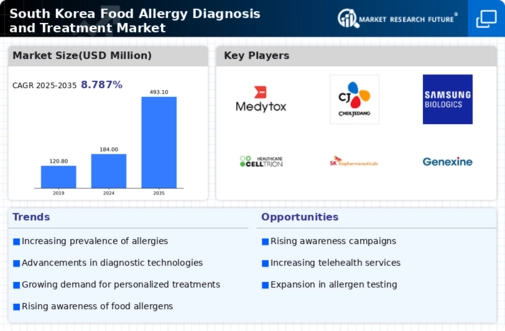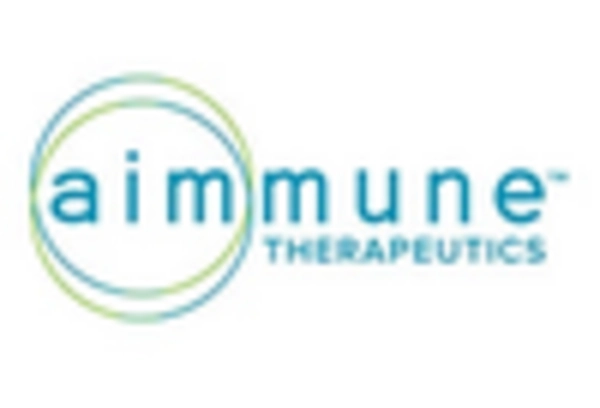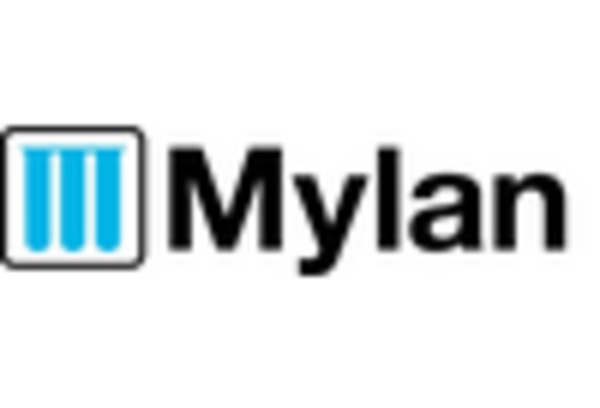Rising Healthcare Expenditure
The increase in healthcare expenditure in South Korea is a crucial driver for the food allergy-diagnosis-treatment market. As the government allocates more resources to healthcare, there is a corresponding rise in funding for allergy research and treatment programs. Reports indicate that healthcare spending in South Korea has reached approximately 8.1% of GDP, reflecting a commitment to improving health outcomes. This financial investment facilitates the development of advanced diagnostic tools and treatment options, making them more accessible to patients. Furthermore, as healthcare systems evolve, there is a growing emphasis on personalized medicine, which may lead to tailored treatment plans for individuals with food allergies. This trend is likely to enhance patient outcomes and drive demand within the food allergy-diagnosis-treatment market.
Growing Awareness of Food Allergies
The increasing awareness surrounding food allergies in South Korea is a pivotal driver for the food allergy-diagnosis-treatment market. Public health campaigns and educational initiatives have heightened understanding of food allergies, leading to more individuals seeking diagnosis and treatment. This awareness is reflected in the rising number of reported cases, with estimates suggesting that approximately 3.5% of the population is affected by food allergies. As awareness grows, healthcare providers are more frequently approached for testing and management options, thereby expanding the market. Furthermore, the demand for allergen-free products is on the rise, prompting food manufacturers to innovate and cater to this segment, which in turn fuels the food allergy-diagnosis-treatment market. The interplay between consumer awareness and market response is likely to continue shaping the landscape of food allergy management in the region.
Technological Innovations in Treatment
Technological innovations are transforming the landscape of the food allergy-diagnosis-treatment market. Advances in biotechnology and immunotherapy are paving the way for novel treatment options that may offer long-term relief for patients. For instance, the development of oral immunotherapy has shown promise in desensitizing patients to allergens, potentially altering the management of food allergies. Additionally, the integration of digital health technologies, such as mobile applications for tracking allergic reactions and managing dietary restrictions, is becoming increasingly prevalent. These innovations not only improve patient engagement but also enhance the overall efficiency of allergy management. As technology continues to evolve, it is likely to play a pivotal role in shaping the future of the food allergy-diagnosis-treatment market.
Regulatory Support for Allergy Management
Regulatory frameworks in South Korea are increasingly supportive of food allergy management, which serves as a significant driver for the food allergy-diagnosis-treatment market. The government has implemented stringent labeling laws that require food manufacturers to disclose allergen information, thereby enhancing consumer safety. This regulatory environment encourages manufacturers to develop safer products and invest in research for better diagnostic tools and treatments. Additionally, the South Korean Ministry of Food and Drug Safety has been proactive in approving new diagnostic technologies and treatments, which may lead to a more robust market. The alignment of regulatory support with market needs suggests a conducive environment for growth, as stakeholders are incentivized to innovate and improve food allergy management solutions.
Increased Demand for Allergen-Free Products
The rising demand for allergen-free products is a notable driver for the food allergy-diagnosis-treatment market. As consumers become more health-conscious and aware of food allergies, there is a marked shift towards products that are free from common allergens. This trend is evident in the food industry, where manufacturers are increasingly formulating allergen-free alternatives to cater to this growing consumer base. Market data suggests that the allergen-free food segment is projected to grow at a CAGR of 7.5% over the next five years. This demand not only influences product development but also drives the need for effective diagnosis and treatment options, as individuals seek to manage their allergies more effectively. The interplay between consumer preferences and market offerings is likely to continue shaping the food allergy-diagnosis-treatment market.
















